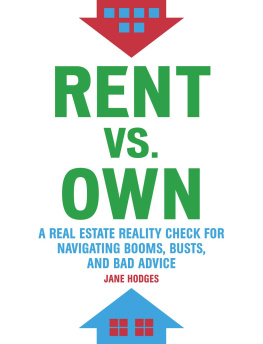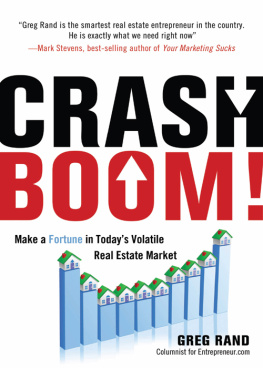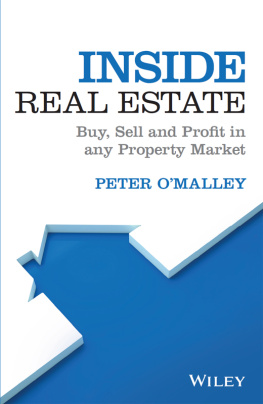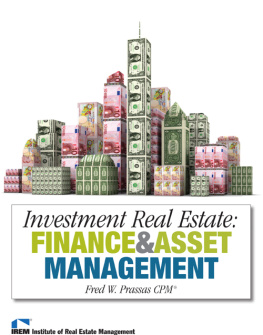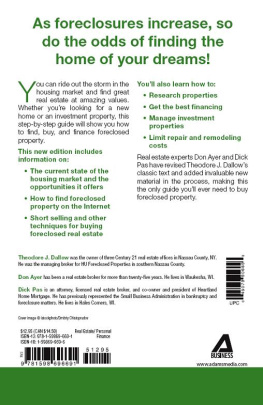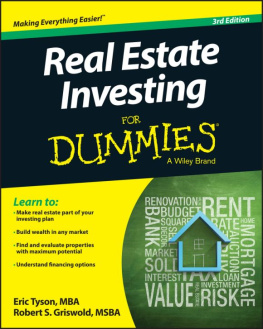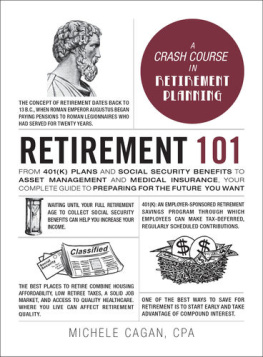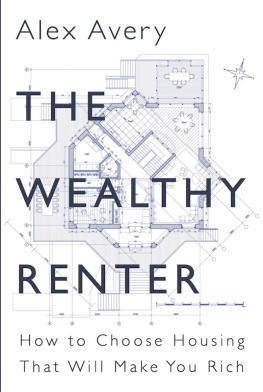DEDICATION
I dedicate this book to Dave, my long-suffering husband, who has put up with botched vacations, weekends, and nights as Ive worked on bringing this book to fruition.
INTRODUCTION
Team Rent, Team Own
The year 2004 was big for me. At thirty-four years old, I bought a home for the first time and I left a job to resume my dream work arrangement: freelancing. I even had a plum gig: The Wall Street Journals real estate site asked me to write two columns about an emerging population of novice real estate investors trying to make money as landlords and rehabbers in the hot market. These gigs werent just an interesting journalistic foray into the then-booming real estate market. They also offered what I saw as a kind of balm for the conflict Id undergone while buying my own house.
You see, my ex-beauIll call him Team Renthad vehemently opposed my becoming a homeowner from the minute I hit my first open house. I, Team Own, had vehemently favored it. It wasnt that I felt renting was some terrible racketId lived happily at five rentals in New York and three in Seattle before I took a first-time-buyer class, talked to a mortgage broker, and started my search with an agent. My rental vita included a one-bedroom walk-up, a drafty turret in a professors suburban Victorian, a roach-laden studio with hardwoods overlooking a crack corner, a librarians sublet, a penthouse with a view, and a low-ceilinged in-law with garden access.
In New York Id noticed that the people whod fixed their housing costs either with hard-to-get rent-controlled apartments or by managing to buy had vanquished one of the great terrors of modern lifedomestic uncertainty. In Seattle Id noticed I could actually afford to buy. On the personal front, much of my life was uncertainmy preferred work style was freelance, my preferred men apparently noncommittal. It seemed homeownership was one commitment I could make, a new foundation that would lead me out of a period of volatility brought on by job upheaval from the dot-com crash, my mothers death from cancer, witnessing 9/11 from the roof of my Harlem high-rise, and a cross-country move to Seattle. Owning a home seemed like it would bind numerous loose ends, maybe even create a kind of learning lab for future writing endeavors.
In early 2004, the sting of my split-up was as sharp as the scent of the olive green paint still drying on my home office walls. But each time I put a byline on another article about someone elses real estate risk-taking, I felt a little more emboldened about my own: Id bought a $225,000 asbestos-shingled Craftsman in an emerging Seattle neighborhood once known as Poverty Gulch. It had four bedrooms (one for me, one for an office, two for housemates if I got fiscally nervous), two bathrooms, a deck, rose bushes. Located downwind from a scrap metal recycler, it also had issuesa tilted front porch, a pink disco-style bathroom, rattling metal windows, and wacky neighbors I nicknamed The Pit Bulls, The Clampetts, and Off Their Meds.
I knew buying involved risks, and that Id have to live up to the challenge of managing my sporadic income amid the steady expenses of owning. I wasnt afraid of those risks. But then, I also didnt understand them. Neither did my friends who were buying, nor the consumers and agents I kept interviewing or reading about in the media. The homeownership rate in America reached its all-time peak that year, hitting 69 percent. Indeed, other than a minority of antsy Team Rent types, bubble bloggers, and economists with nicknames like Dr. Doom, who wasnt willing to plant a flag on Planet Ownership? Lenders were flexible, loans were cheap, home prices were risingand how, in some markets. At the time, it seemed that barriers to buy had vanished while the rewards for doing so just kept coming. We all know now these conditions were precursors to a bubble. But back then, life was still innocent.
Indeed, I spent much of my life in a red-faced Rent vs. Own debate. The debate, when I held my own version of it, was small potatoesmainly about two incompatible peoples views on commitment and money, and how real estate choices symbolized them. Team Rent and I certainly had differing real estate histories that colored our psychologies accordingly. I was raised in a 2,400-square-foot brick Cape Codstyle house my family had owned in Richmond, Virginia. Owning worked out well for us: My father sold the home three decades after hed bought it, for $250,000 above its purchase price, and used it to launch retirement. Team Rent was raised in a small but pleasant rent-controlled apartment in Manhattans huge Peter Cooper Village complex. Growing up, his familys rent was so cheap compared to renting at market prices that living otherwise wasnt really an option. His family stayed put and stashed their savings.
Team Rent was a wanderer, opting to work as a merchant marine and sometimes professor, keeping his things to a minimum and bags packed. I was a mental wanderer, willing to live in one city, apt to rearrange the furniture and rsum rather than relocate. I thought owning might be a good organizing principle for my peripatetic adulthood. Team Rent thought my idea of owning was code for wedding bells and babies. He also just had a thing against owners, against people who participated in matters he considered mainstream and capitalist, which he imbued with a more-disgusting layer of greed and materialism than was necessarily the case. He thought owners underwent a near-fundamentalist conversion, transitioning from interesting people to Stepford-like husks of their former selves, congregating with other joiners at backyard fences to act the part of homeowner, a role he saw involving conversations about contractors and dip recipes, gardening tips and bulk-buying at Costco. That theyd pay handsomely for this privilege was even more unfathomable to him: He thought all debt was bad debt, that a fixed-rate mortgage was as dangerous as a payday loan.
He already knew my stated personal reasons for buying, even if he didnt believe them, so I tried to make the economic case to him, while reminding him that buying a home wasnt a slippery slope of material silliness. First, I told him I was using a sensible FHA mortgage. I was planning to stay for a long time. I could afford my new monthly expense but had room for housemates if I needed rental income. I was saving. I had a home-repair strategy: When I had more equity I would borrowcarefullyto fix up my homes funk factor. And I was eligible for tax deductions on my mortgage interest, property tax, and even my home office. Team Rent wasnt convinced. He told me I didnt know what I was doing, that I was impulsive. I told him that I could do it without him. I liberated him, and he lined up a date with a renter.
Fast-forward to 2012, and the personal debate I went through with my now-ex is a quaint microcosm of a debate thats grown in size and scope and proportionand is everywhere, writ large across the American landscape. Its a battle many adults are having with themselves and their families, and its colored by the headlines: Politicians and industry leaders are debating the governments role in enabling affordable mortgage finance. Historians and students of sociology are studying the role of ownership and whether it is, or should be, a key ingredient in the American Dream. Under what circumstances does it still make sense to own? Is renting really such a bad deal after all? Which choice is riskier? Which choice makes more sense in a modern, mobile society?
In case youre wondering what became of my home in Poverty Gulch, bought at the height of a bubble, let me fill you in: From 2004 into 2007, my house rose in value, a boat rising with both Seattles and the national markets tide, but also because Seattle funded two park projects nearby, giving the area an aesthetic injection. My new boyfriend (also on Team Own!) sold his place in 2006 to move in with me, and I told him that, assuming I could do it profitably, Id sell the Poverty Gulch cottage in 2007 so we could buy our own place and start anew together. We both agreed that wherever we moved in 2007 was where wed retireperiod, and end of story.

